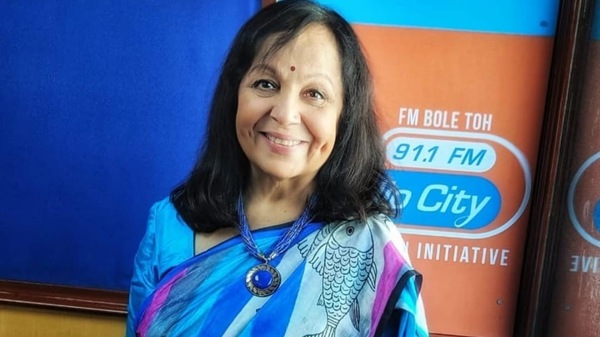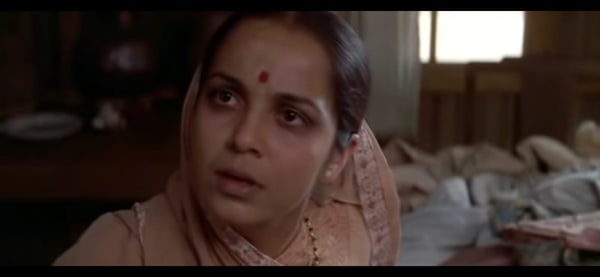Exclusive- Rohini Hattangadi opens up on working with Vidya Balan and Shefali Shah in Jalsa
The veteran actress also revealed which Shakespeare character she wants to play in a stage production

Last Updated: 02.15 PM, Mar 28, 2022
National Award winning actress Rohini Hattangadi’s film career spans over four decades. The actress, who started her acting career on stage, has been a part of renowned films such as Gandhi (1982), Arth (1982), Party and Saaransh (1984). The actress was recently seen alongside Vidya Balan and Shefali Shah in Jalsa, and was also a part of the Gujarati web series Kshadyantra. The actress recently spoke to OTTplay about her theatre career, her role in Gandhi, Jalsa and more. Excerpts…
It’s World Theatre Day(March 27) today and you’ve had a prominent career in theatre. You got your start in the acting field through theatre as well. Not only that, you were the first Indian woman to act in a Kannada play with Yakshagana and also the first Asian to act in a Japanese Kabuki play. Tell me about that.
A: Kabuki play was done in Hindi. Traditionally, they dont allow ladies to act. Just like what used to happen here, long ago male actors used to play female characters. In Yakshagana also I was the first one (female actor) to act in any Yakshagana play, and also the first Asian to play in a Kabuki play.
So, you were a trailblazer when it came to your theatre career…
Yes, but nowadays girls are learning Yakshagana and there is a Yakshagana academy in Bangalore. They have a lot of girls going there. But I was the first one, in 1973 I think (laughs).
Were you ever nervous to take on big roles or felt any kind of pressure when taking on such prominent roles at the start of your career?
Since it was our student days, we took full advantage of our first experiences, not bothering about mistakes. Mistakes toh ho hi jaata tha. Not bothering about your career and everything, so we could experience it more in student days than maybe now. Now our career or reputation is at stake. That time it was not there so I always tell people ‘jo mistakes karni hai na woh student days main hi karo aap’. At that age, you are allowed to make mistakes.
Those were the days when I was in the National School of Drama, where those things were happening. So it was an afterthought that ‘oh i’m the first person, oh I was the first person’. I didn't do it purposely. It so happened that I was the first one, you know. But whatever was given to us, we tried to experience it, we tried to do it fully, wholeheartedly.
We had a project called arts and crafts of Mohenjodaro and if I had thought ‘arts and crafts, what does that have to do with my acting,’ I would have missed out on so many things. Even with a single ‘clue’ you can build a ‘pahaad’. Like, if there is a bullock cart toy found in harappa, through that toy, that clue you can say that there was transport, some kind of transport outside their country because mesopotamian coins were found there. And there were toys, so they cared about children, cared about their well being. So these things you can derive from little things and that is true for our characters also.
Anything which is learnt, sometimes, somedays you definitely benefit from it.
You were also a part of your first Gujarati web series also recently, in the form of ShemarooMe’s Kshadyantra.
I’ve been doing Gujarati for the last so many years. I became a part of this one and then realised that this was my first one (Gujarati web series). (laughs)
The platform also has its fair share of plays. So could we expect to see you in any plays on ShemarooMe in the future?
I’m doing films right now, since theatres were shut for two years. Although now they have given permission and slowly plays and theatres are coming up but I've got a film on hand in April.
Can you talk a bit about that film?
Still the preparations are going on, so I don't know whether I can talk about it (laughs). I’m goin on sets on the seventh of next month.
I also wanted to know a bit about your acting process. You’ve acted on stage, as well as on television and in films. So was there a kind of transition in your acting methods or did you have to adjust your approach to the different mediums?
Well, it depends. Acting also depends on the style of the play. There are so many kinds of plays - realistic plays, folk plays. So you can’t act realistically in folk plays, as they’re different. So with every play, you have to take into consideration the style of the play, how it is written, what the writer and director wants to say, the way it is presented. So accordingly, you have to change your approach, even to acting.
It is the same thing with films. With commercial Hindi films, you know the acting. It varies. Beforehand, you can’t know or decide on the style of acting you’re going to do. During the process, you find out how you are going to present yourself.
So there has to be a sort of adaptability.
Yes, you can’t decide in the beginning. It's an amalgamation of many arts and it's a collaborative art. So you have to adjust yourself accordingly.
Your recent film role was in Jalsa with Vidya Balan and Shefali Shah. What attracted you to the film?
I liked the subject actually. Each and every character has a grey in the film. When I went on the set, it was a totally different kind of atmosphere there, it was so relaxed and everybody was connected to each other. It was not like Bollywood ki apna kaam karo aur chale jao. We had meetings beforehand also with Vidya and Shefali. All of us were together rehearsing for a scene together, and it was fun working with both of them. The story of the film attracted me and Suresh Triveni is a very good director. He knew what he was doing and could get me into it.
Is there a particular genre of work you’re interested in?
No, whatever comes up. I haven’t done any Shakespeare plays till now. I want to try a Shakespeare play one time. To read and analyse it is one thing, and to act in it is a totally different thing. You try to imbibe yourself into it.
Do you have a favourite Shakespeare play?
Favourite in the sense, Macbeth maybe. Lady Macbeth. A very ambitious character.
Gandhi completes 40 years this year. You earned a BAFTA award for the role, and your role as Kasturba was widely appreciated. Could you talk a bit about your experience working on the film.
It was right at the beginning of my career actually. I passed out from National School of Drama in 1975, and the film I got just after 5 years. It was like a dream.

In the beginning I didn't realise the magnitude of the film. I realised it during the shoot. One, I got the role so I have to do it nicely. But when I started shooting, day by day I realised that oh my god this is a big film I am doing. (laughs).
Subscribe to our newsletter for top content, delivered fast.
